‘You can’t paint them with one brush.’ Trump, Biden face perils, promise wooing Florida’s Latino voters
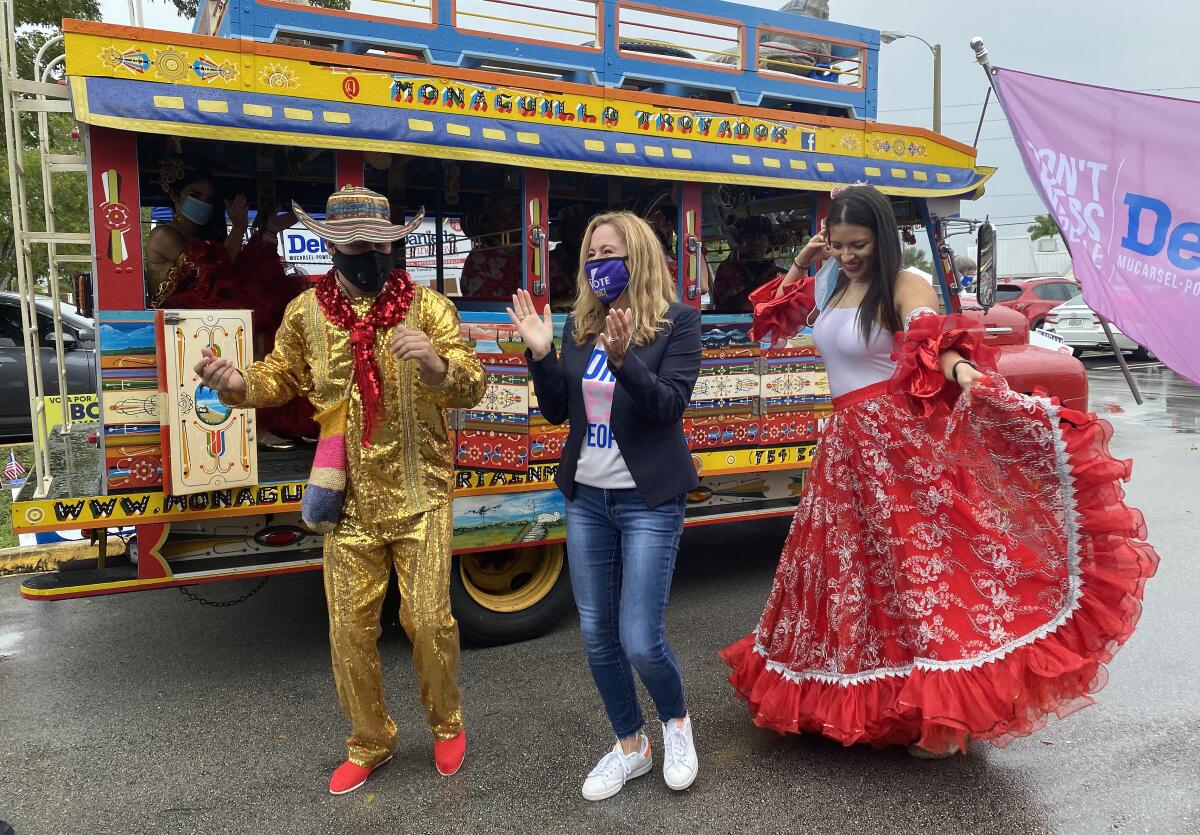
MIAMI — Karem Yepez proudly displayed her Latinos for Trump sign in the windshield as the car inched along a busy stretch of road as part of a caravan.
Her driver, Alfredo Zapata, was not happy about her love for President Trump; he called Yepez a parrot and a follower. She called him uninformed and blind.
He’s CNN, she’s Fox News. His phone background declares, “Wear a mask.” She often lets her face covering drape halfheartedly under her chin. Yepez immigrated from Ecuador; Zapata from Colombia.
“He fights, I don’t,” she said from the back seat of the car. Her husband — and chauffeur — shook his head. “I don’t fight,” he grumbled. “We have different ideas.”
This election, the longtime married couple will cancel each other out when they cast their ballots in this perennial battleground state, a must-win for Trump.
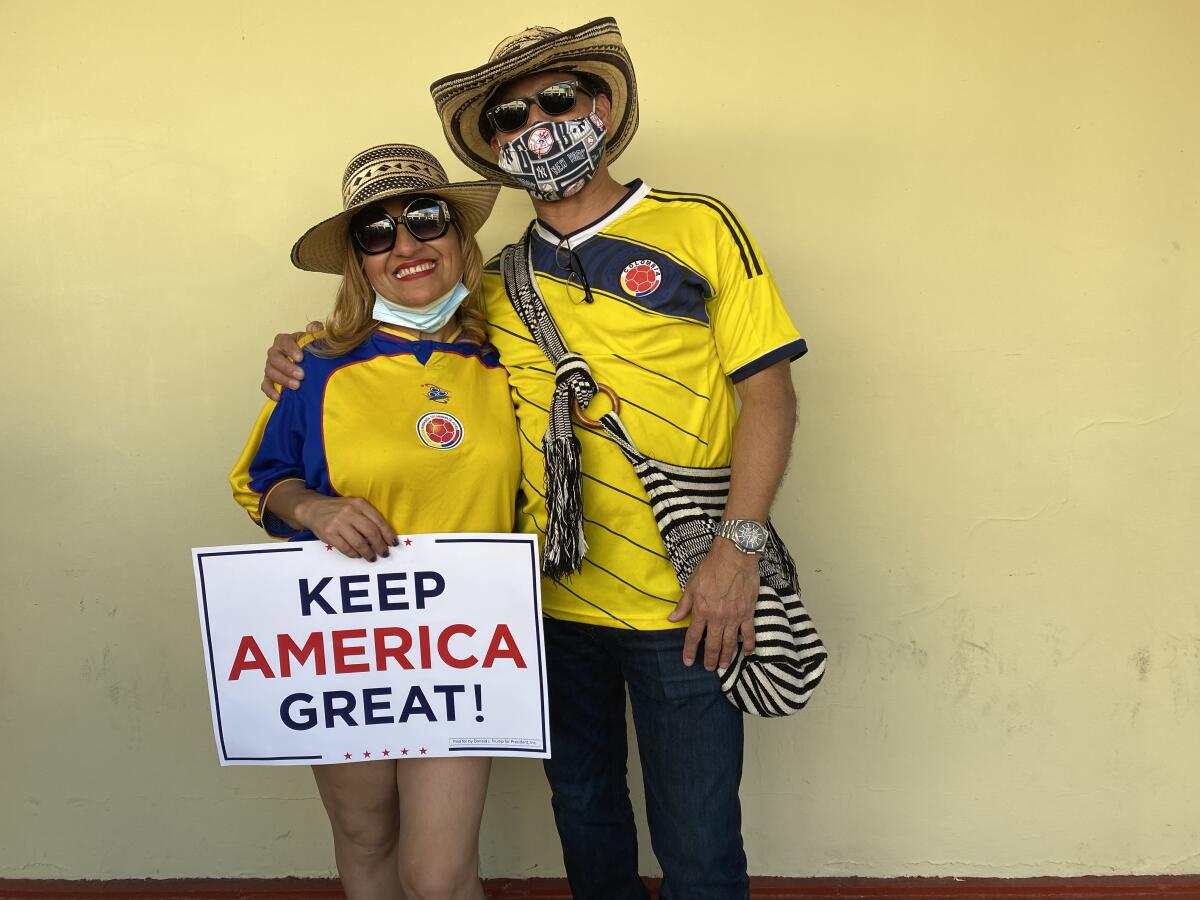
For many, Florida is the beating heart of the nation’s largely right-leaning Cuban community; the state also has a large population of Puerto Ricans, who tend to vote Democratic. But Yepez and Zapata represent a growing share of the Latino electorate: Those whose roots aren’t planted in either the Caribbean country or the U.S. territory.
If there is a true melting pot of Latinos in the U.S., it would be Florida, which has significant numbers of people — and voters — from across Latin America. Latinos other than Cuban and Puerto Rican make up 44% of the Hispanic electorate, according to the Pew Research Center.
The state is home to Mexicans, Colombians, Dominicans, Venezuelans and Nicaraguans, to name a few. Within the various groups of Florida’s Latinos, the Biden and Trump campaigns see both political opportunity and peril.
“The Hispanic electorate in a place like Florida often gets summarized in a broad-brush stroke of, ‘it’s Cubans and Puerto Ricans.’ In reality, 40-plus percent of the Hispanic electorate is neither of the two,” said Stephanie Valencia, president of Equis Research, a Democratic polling and research firm. “That’s actually where the most opportunity lies with Joe Biden in these closing days of the election.”
The power of the non-Cuban, non-Puerto Rican vote in the state has become clear over the last few weeks, as both parties politically target-bombed these groups with appeals for their votes.
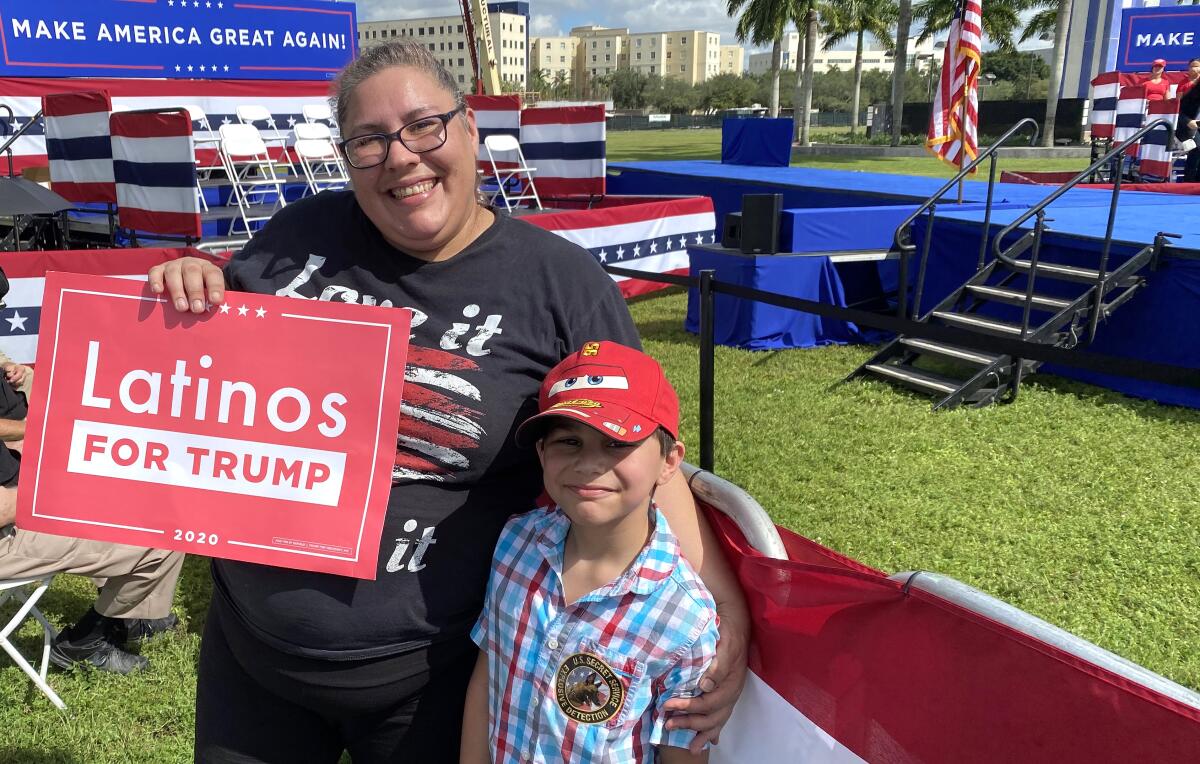
In the shadow of the Memorial Cubano in Tamiami Park, Vice President Mike Pence told a crowd of mostly Latinos that Trump stood with the “freedom-loving people of Colombia,” and for free and fair elections in Nicaragua and against President Nicolás Maduro of Venezuela.
Earlier this month, Biden wrote an op-ed in El Tiempo, a Colombian newspaper: “I have said many times that Colombia is the keystone of U.S. policy in Latin America and the Caribbean, and if I have the honor of being elected President, I will make rebuilding our relationship with Colombia a key foreign policy priority of the Biden-Harris administration.”
In a state that for years has been won by slim margins — Trump defeated Hillary Clinton by 1 percentage point here in 2016 — any one of these disparate communities could make the difference.
“In the end that very, very small margin could be determined by Venezuelan voters, by Dominican voters,” said Eduardo Gamarra, a professor of politics and international relations at Florida International University. “However you play this game, any single community can claim that they elected the next president and they won’t be wrong.”
Mexicans are the largest population of Hispanic origin living in the country, accounting for 62% of that population in 2017, according to the Pew Research Center. Much of that group is concentrated in California, Texas and Arizona.
Florida’s Latino population is largely a byproduct of the tragedies that have affected an array of countries in Latin America. Gamarra calls Miami “a collection of U.S. foreign policy failures.”
There was the Cuban revolution and a “failure by the U.S. to contain [Fidel] Castro in the 1950s,” Gamarra said. Then, in the 1980s, there was U.S. interference in Central America, which resulted in a surge of Nicaraguans fleeing their country. More recently, Gamarra pointed out, the crisis in Venezuela, a country gripped by economic free-fall and political unrest, has led to a wave of migration.
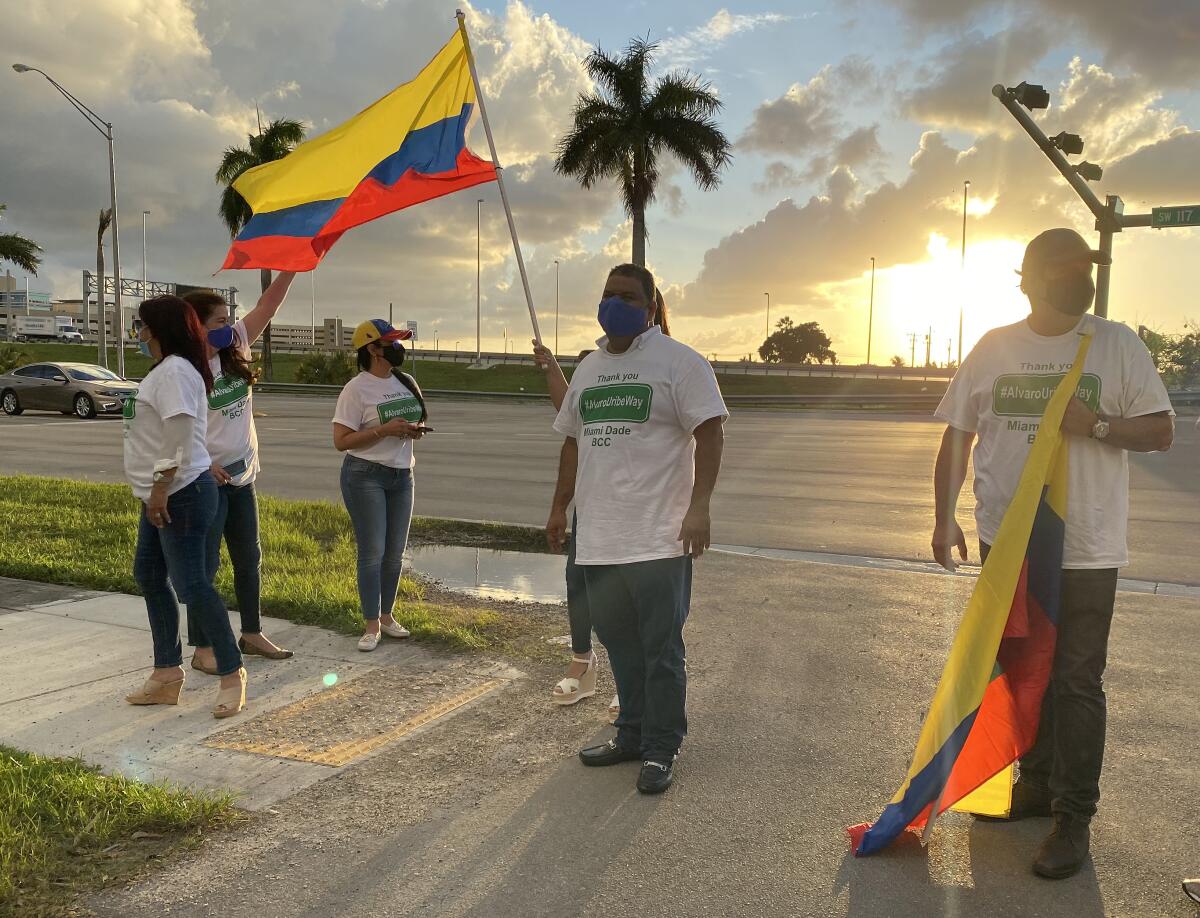
It’s an influx that has shaped the cities scattered throughout Miami-Dade County. In Doral, nicknamed “Doralzuela,” Venezuelans eat arepas a few yards from a statue of Simón Bolívar, a fellow countryman who led six nations to independence. In Sweetwater, known as Little Managua, Nicaraguans pass a mural of the poet Rubén Darío on their way to La Chipiona bakery and Fritanga La Chavala restaurant.
When it comes to voters in Florida, Valencia said, Democrats must “think well beyond the binary approach that I think we have been accustomed to.” Just because two Floridians hail from South America, for example, doesn’t mean they think the same politically. Case in point: Yepez and Zapata.
Zapata’s family left Colombia in 1977 and landed in New York, before eventually moving to Miami. Yepez was 12 when she and her brother arrived in Los Angeles from Ecuador.
Yepez has been a lifelong Republican, although the 53-year-old admitted voting for a second term for Obama. She hoped his promise of immigration reform could help her sister in Ecuador.
“I thought it was going to help immigrants and it never happened,” she said. Now, she keeps a Trump flag in her apartment and her Jack Russell Terrier’s blue and red leash is stamped with “Trump” and “Pence.”
There is no law of political reciprocity in this household: Zapata is not allowed to put up anything for Biden.
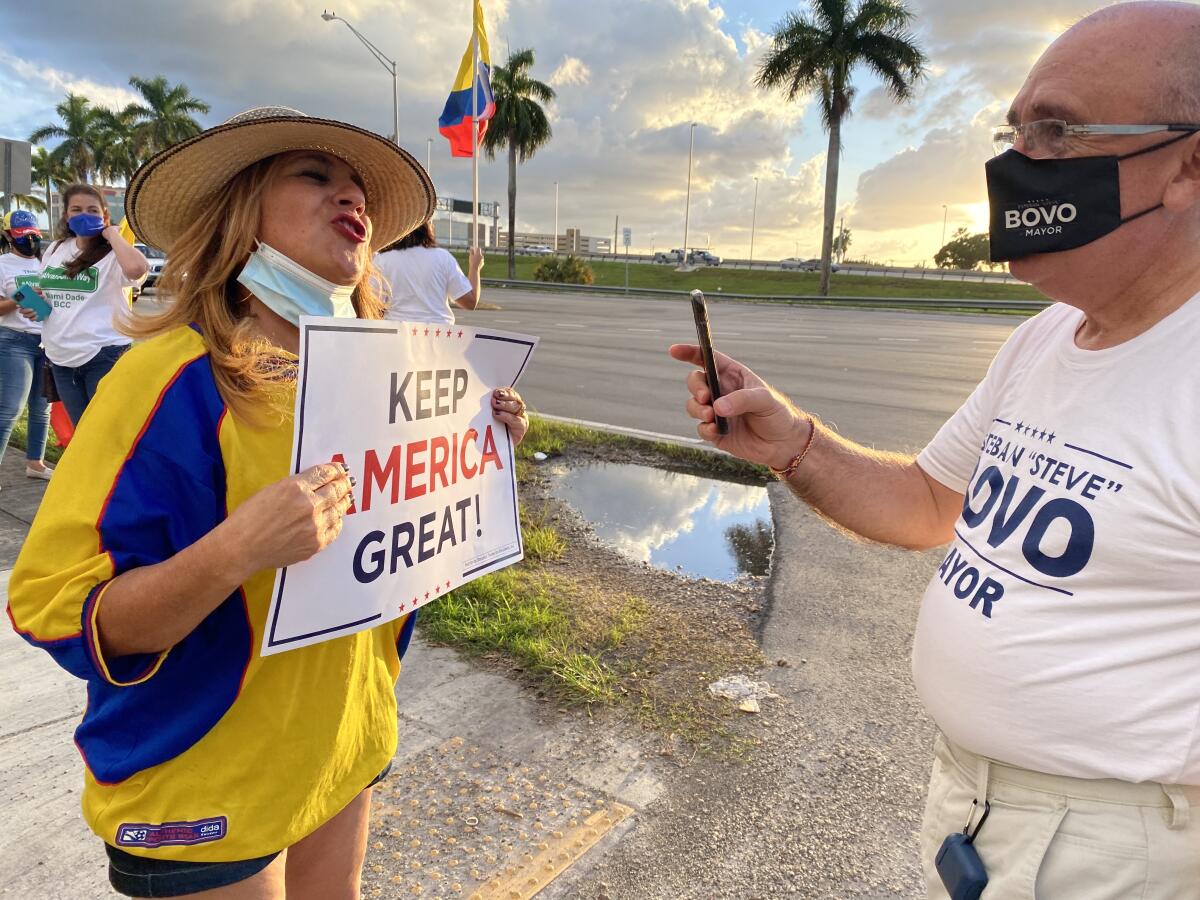
She knows more than her husband, Yepez said, because he’s stuck at his job working in customer service for an airline while she often travels to Ecuador where she said Venezuelans have landed after fleeing socialism in their country.
“He’s not informed, he’s not in my world,” said Yepez, who runs her own marketing agency that qualified for a loan from the Paycheck Protection Program. “He didn’t come here for political reasons, he came here for an opportunity.”
“Those with the Republican Party think that the United States will become a socialist country if Biden wins,” said Zapata, 58. “That’s a myth.”
The couple sat in their car in the caravan of Colombian Americans, celebrating the fact that Miami-Dade commissioners voted to name part of a street after former Colombian President Álvaro Uribe Vélez.
Amid a chorus of honks, Yepez and Zapata debated the economy, COVID and which candidate represented law and order. They even argued over their 16-year-old son’s political views. Yepez said he was a Republican; Zapata accused her of putting it in his head.
The country is made up of immigrants, Zapata said, and he would “vote for those who can’t vote.” Zapata is supporting Biden because he agrees with the Democrats’ ideology that “everyone should have equal rights.”
Democrats are careful when it comes to COVID, but he believes Republicans aren’t. He said his wife has the same mentality as a horse with blinders on; she demanded to know why he was against her.
“Not against you,” he said. “Your party.”
At Tamiami Park, Yepez and about 100 other people sat in white chairs in the sticky heat waiting hours recently to see Pence. They wore shirts that read “Cubanos for Trump,” “Cuban bred” and “Nicas for Trump.” Yepez, her hair tucked up into a Keep America Great hat, wore an American flag scarf and a Trump-Pence T-shirt.
Yepez’s best friend, who was born in Cuba, blasted Los Tres de la Habana’s “Trump Song,” an earworm with lyrics like: “Ay, por Dios, yo voy a votar por Donald Trump.” By God, I will vote for Donald Trump.
When Kamala Harris’ name came up, they shouted, “que mala.” She’s bad.
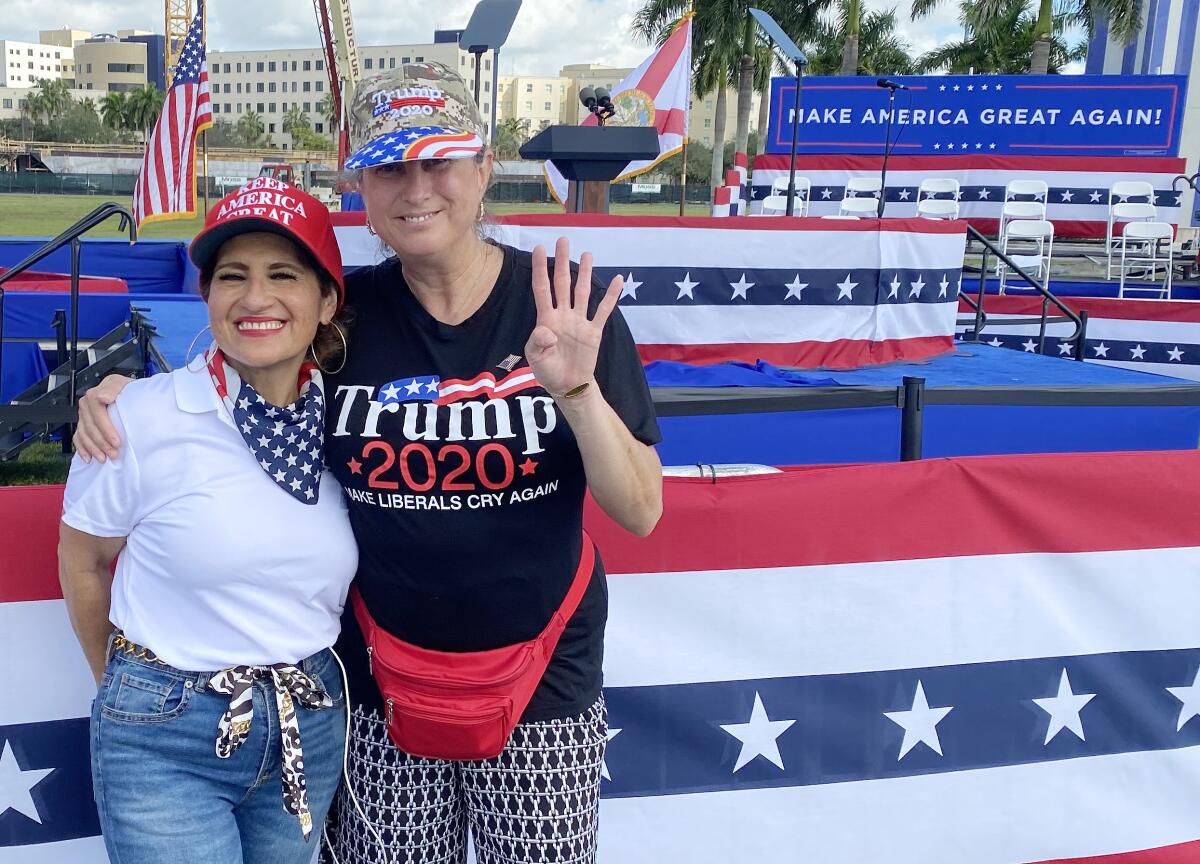
Latinos at the Pence event said their support for Trump stemmed from a love of law and order and a hatred of socialism, which every speaker that afternoon conjured up like a bogeyman. Because South Florida is made up of refugees who fled dictatorships, including leftist ones, the cry of socialism has considerable resonance.
Before Fabio Andrade, a Colombian American Republican who stepped up on stage to speak, a white man spotted his yellow, blue and red mask and shouted: “Viva Venezuela.”
“Colombia,” Yepez corrected him.
“Cuban American friends, we hear you,” Andrade, who wore a sombrero vueltiao, a symbol of his birthplace, boomed into the microphone. “We are here in solidarity — Colombians, Venezuelans, Americans, Nicaraguans, everybody.... We want to make sure this country doesn’t go into socialism.”
There are more than 200,000 Colombian eligible voters in Florida, making up 8% of the Hispanic electorate, according to the Pew Research Center. It’s a population that is focused on which candidate is best for the economy and which will have a strong foreign policy in regards to Latin America, said Andrade, who lives nearby in Weston.
While Colombians have historically leaned Democratic, Gamarra, the politics professor, found that support for Trump among them in Florida has grown by 5% to 8%.
On the first day of early voting in the state, Democratic Sen. Annette Taddeo joined other elected officials on a Chiva bus caravan for Biden.
“When you ask any Latino in Florida, ‘Oh what’s your background?’ For the most part they tell you, ‘I’m Colombian, I’m Venezuelan.’ They don’t say, ‘I’m Hispanic,’” said Taddeo, who is Colombian American. “That tells you everything about the pride of the origin. You can’t paint them with one brush. It’s really important that they feel you’re paying attention as a campaign.”
Perhaps surprisingly, the largest group of Hispanic eligible voters in Florida after Cubans and Puerto Ricans is voters of Mexican heritage, according to the Pew Research Center. Gamarra found that between 2000 and 2010, the Mexican population in the state grew by 120%.
And yet, according to Evelyn Pérez-Verdía, a Democratic Latino issues strategist in Weston, “many times the campaigns don’t do anything to engage them.”
Almost a year ago, Pérez-Verdía started including the Mexican-American community in radio ads in the state, asking them to demand respect and register to vote. She also pointed to an ad by the Biden campaign called “Decepciones,” which included mariachi music.
When Ana Anicama arrived in the Sunshine State from Los Angeles in 2000, it felt like a culture shock. Her neighbors in Miramar are Colombian, Venezuelan and Cuban. To be Mexican in Florida, she said, felt “lonely.” But regardless of where she lives, her political views won’t change.
“I would never vote for Trump,” said Anicama, who lacked legal status for years.
Anicama, 61, joined a “Blue Tsunami Biden Caravan” on a recent Sunday. She rode in a car with an American flag and with Biden-Harris signs taped to the windows. All she was missing was a Mexican flag; she didn’t know where she could buy one in Florida.
That same day was Yepez’s 17-year anniversary with her husband. The couple were supposed to head to Cancun, but couldn’t leave their son home alone.
Instead, they planned on dinner together. He would spend the day watching soccer. She would spend it in a caravan supporting her main man of the moment: Donald J. Trump.
More to Read
Get the L.A. Times Politics newsletter
Deeply reported insights into legislation, politics and policy from Sacramento, Washington and beyond. In your inbox three times per week.
You may occasionally receive promotional content from the Los Angeles Times.











